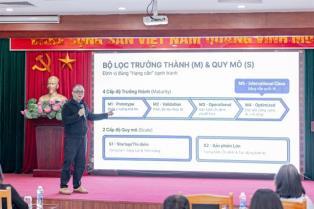Scaling up digitalisation for SMEs requires solid data foundation: experts
A discussion panel was held as part of the Autumn Economic Forum in HCM City on November 26, in which experts mulled how Việt Nam can better take advantage of 4.0 technologies for sustainable development.

HCM CITY — Experts suggested ways Việt Nam can better take advantage of 4.0 technologies for sustainable development at the Autumn Economic Forum in HCM City on November 26.
Nguyễn Văn Dũng, deputy chairman of HCM City People’s Committee, said that Việt Nam must stop relying on old advantages, and instead pursue more efficient production models and master new technology trends, such as AI, Internet-of-things, big data and automation.
“HCM City identifies the development of industry, high-tech, application of science and technology, green economy and digital economy as key drivers for growth in the upcoming time.”
Andy Yu Shihao, senior vice present Global Supply Chain, International Region at Schneider Electric, Singapore, said that focusing on sustainability does not mean higher costs; while the cost for specific initiatives may be high, the net financial benefit overall is still positive.
Large companies around the world are pursuing net-zero targets, so small companies investing in sustainability also means better competitive advantages in the future.
Trần Anh Tú, deputy director general of the Department of Information, Technology and Industry under the Ministry of Science and Technology, said that Việt Nam is taking small steps towards smart and sustainable production.
He stressed the importance of assisting businesses in improving their capabilities, through training programmes, networking opportunities, and learning from exemplary production models, such as the "Lighthouse Factories" model, which are manufacturing factories recognised by the World Economic Forum to have effectively implemented 4.0 technologies and automations for higher efficiency and sustainability.
Việt Nam itself has a "Lighthouse Factory" from Foxconn Industrial Internet in the former Bắc Giang Province (now a part of Bắc Ninh), with its integration of AI-powered systems for 3D city-scale mapping and security monitoring, significantly enhancing operational efficiency and real-time monitoring.
Việt Nam is also helping small- to medium-sized enterprises (SMEs) to network with research institutions for technology transfers, scaling up businesses' application of technologies in production.
Experts at the panel talked about how Việt Nam should utilise AI, new technology and smart production to enhance local products, moving from simply assembling technology products to improving its ability to actually produce modules and components.
Liu Zongchang, rotating CEO of China's Foxconn Industrial Internet, said: "Assembly jobs require good labour efficiency and labour cost, in which I think Việt Nam has very good advantages. If you want to move to modules, the more important thing is automation."
"Modules are smaller subsystems in smaller size, but actually require a much faster production rate. So Việt Nam needs automation, the talent, and the local technology providers here to make this type of product."
The next step, components, requires further investment in innovation and R&D talents, but if Việt Nam already has a strong foundation in assembly, it is capable of moving on to module production, he said.
Nguyễn Dạ Quyên, co-head of the Centre for Smart Manufacturing and Supply Chain under the HCM City Centre for the Fourth Industrial Revolution, said that in Việt Nam, around 60 per cent of SMEs are at the early stages of the digitalisation journey, with many using programmes to manage manufacturing activities and plan its resources.
"The real bottleneck for businesses applying AI tech is data readiness. Many SMEs know AI can help, but they are unsure where to start, what use case, what data set to have, which partners to work with, etc."
Data in many Vietnamese companies remains fragmented in different systems, and different departments may even have inconsistent data.
Vietnamese businesses should focus on being coordination-driven, not automation-driven. A factory that best integrates humans, systems, and data together has the ability to scale up fast.
Andy Yu Shihao said that when considering investment and returns in automation and AI, Việt Nam should not start off with large applications, as AI tech can be expensive.
Companies should first try out AI technologies in small, specific pain points, where AI tech can provide immediate benefits. From there, they can create roadmaps to increase their tech applications.
For example, his company tried out using an AI-vision camera system for quality inspection, which has been providing very high accuracy levels while also being very cost effective. His production plant is also using AI tech to identify loss of labour efficiency, showing room for improvement.
It is also important to ensure a sound data infrastructure, which is required for AI applications, as well as a shift in company culture to allow expert staff to share experiences and passion, and co-learn more easily, so that a factory or facility can scale up together, he said. — VNS



